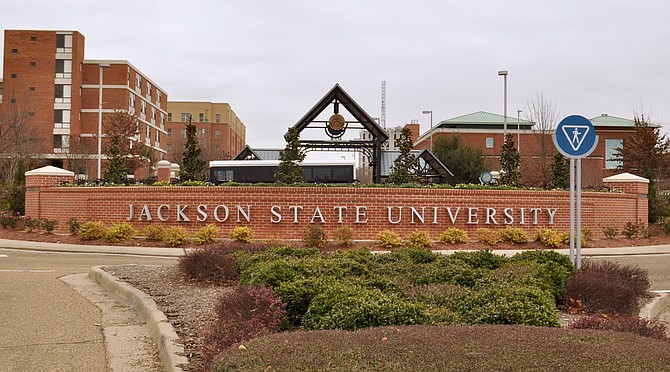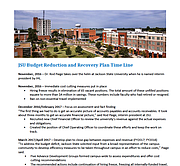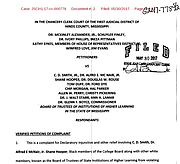Jackson State will take a $4-million cut and welcome a new president, Dr. William Bynum of Mississippi Valley State University, all in one summer. Trip Burns/File Photo
Jackson State University students, faculty and staff members went through a whirlwind of hiring and firing in the last two weeks
First came the news that Dr. William Bynum, the current Mississippi Valley State University president, would move to Jackson to become JSU's new president. Then, interim President Rod Paige announced budget cuts for the university, which has struggled with finances in the past year. (Those struggles had led to the departure of former President Carolyn Meyers in 2016.)
An academic shuffle will ensue, leading to the consolidation of several departments. The budget reduction and recovery plan addresses JSU's fiscal needs after taking a $4-million cut in fiscal-year 2017, albeit with tough medicine.
Paige's plan rolls the School of Journalism and Media Studies back into the College of Liberal Arts, for instance. And while no faculty will lose their jobs, 42 staff members will receive 30-day notice pink slips.
JSU has been on uncertain ground financially since Meyers departed last November, after news broke that JSU's cash reserves were down to $4 million, from $37 million in 2012, the Associated Press reported.
State law tasks the IHL Board of Trustees with hiring leaders for each public university in the state, but IHL developed its own search policy. The JSU president search began with calls for nominations and the formation of committees of alumni, students, staff and faculty members.
The IHL board contains 12 governor-appointed members, none of whom attended one of Mississippi's three public historically black colleges or universities. Board members must be from different geographical locations in the state, based on state Supreme Court districts.
Bynum is leaving Mississippi Valley State, the smallest of the state's three public HBCUs, after serving as president there since 2013.
Faculty and students that the Jackson Free Press spoke with about the transition all indicated their primary problem with the president search process is not on Bynum's shoulders, but instead the fault of the college board.
The state college board began the JSU president search in late 2016, with calls to create two committees made up of JSU stakeholders: one to help read applications and another to help with the interviews. The campus search committee (the larger of the two) never met in person, Dr. Robert Luckett, who served on the committee, told the Jackson Free Press.
While the college board rules do not require the group to physically meet, Luckett said the process was far from transparent, and that the campus search committee voted for their top five picks through an anonymous Doodle poll.
Luckett, an associate professor and the director of the Margaret Walker Center on JSU's campus, said the committee never saw the results of the poll.
IHL policy does call for each search committee member to vote "by secret ballot," but then the college board determines who gets a first-round interview. This provides little way of knowing whether the stakeholders' picks were actually the same candidates who were asked to interview for the post.
Luckett said he understands keeping the names of applicants confidential so as to not jeopardize their current job positions (potentially at other universities). However, he said the rest of the process should to be as public as possible. The campus search committee received 53 applications to review, Caron Blanton, director of communications with IHL, told the Jackson Free Press.
"There were some good ones; some were bad ones; some that would make excellent presidents," Luckett told the Jackson Free Press. "Again, I understand the reason to have a confidential search, but the process itself, to me, should be a public one."
After narrowing down the pool, according to policy, the IHL board conducts the first round of interviews with "input from the Interview Search Advisory Committee." After the body checks references and performs background checks, it shares the results are with the smaller interview committee. Beyond that, the decision is the board's responsibility.
After the board named Bynum as its preferred candidate on May 22, skepticism began to leak out. In a public letter sent to alumni and published in The Clarion-Ledger, Jean Frazier, an alumna who served on both the campus search and interview committees, called on the board to re-think its selection.
"At the conclusion of the first-round interviews and following deliberation with the board about the candidates, we were assured Bynum was no longer under consideration," Frazier wrote. "Given the significant objection to Bynum's candidacy, one board member acknowledging the concerns remarked, 'we don't want to give you someone you don't want.'" Frazier then writes that Bynum was not among the three candidates who received a second-round interview, so when the college board announced Bynum on May 22, committee members were shocked.
Blanton could not confirm this, due to the confidentiality of the process. "The board's policy is to keep the identity and status of all candidates confidential until they name a preferred candidate," she said.
The alumni association released another letter expressing concerns with the process after the board announced Bynum. IHL clapped back with a May 30 letter from its president, C.D. Smith, warning committee members that they agreed to the confidentiality of the process—and that ultimately, it is not their decision.
"To the extent that some of the members of the JSU advisory committee believe that they are entitled to direct the Board as to which candidate would be selected as the Preferred Candidate, they are mistaken," the letter said.
Bynum visited the JSU campus on May 31 and was named president that same day.
Luckett emphasized that he places no blame on incoming President Bynum for what he views as a flawed process, and said he will fully support him when he arrives July 1. Students have also expressed their frustrations, but some see the need to move forward and look ahead.
Karmeen Powell-Childress, the senior class president in Jackson State's Student Government Association, expressed support for Bynum, saying the number-one thing she wants in a new president is transparency in the school's financial status.
"Where do we go moving forward, and how we can help? What is our role in assisting the process of making our school better?" she told the Jackson Free Press. "I want our president to not only share with us what's going on, (but also) let us know if we can help."
The clash between the JSU community and IHL culminated in several alumni filing a lawsuit in Hinds County Chancery Court that alleges that the IHL Board of Trustees discriminated against Jackson State and the two other public HBCUs in Mississippi with its president search.
"Mississippi would never consider taking the Chancellor of the University of Mississippi to become the President of Mississippi State University nor would Mississippi consider transferring the President of Mississippi State University to the University of Mississippi. ... Is this an attempt to close Mississippi Valley State University? Why move him unless the intent is to destroy both institutions," the initial complaint, filed on May 30, says.
The JSU community is historically wary of IHL. Alcorn, Mississippi Valley State and Jackson State University all lack representation on the board, which is comprised of members appointed by Gov. Phil Bryant and former Gov. Haley Barbour.
In his 2009 proposed budget cut, former then-Gov. Barbour made national headlines for trying to consolidate all three of the state's HBCUs into one to address budget shortfalls. By moving Bynum from Valley to JSU and creating the need for another president search in the the state, some alumni and faculty see shadows of that past.
Email state reporter Arielle Dreher at [email protected].




